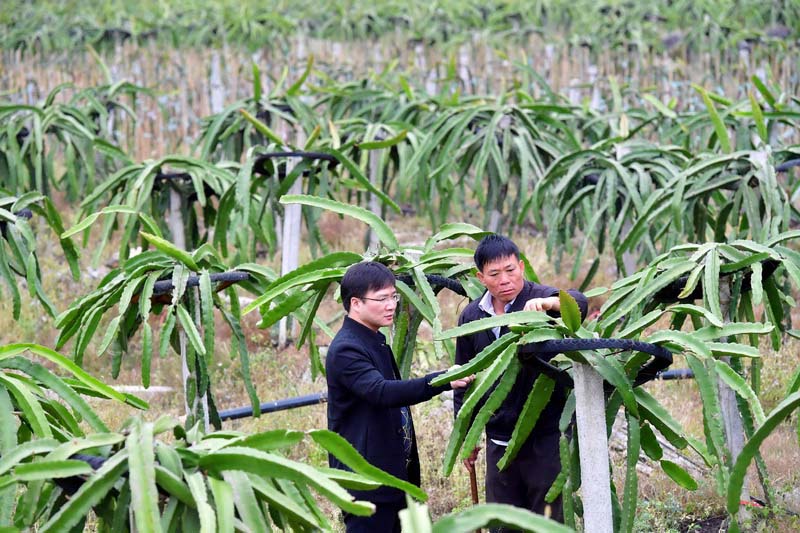Poverty alleviation in Baise: An example for old revolutionary base areas
p.china.org.cn, July 3, 2017 Adjust font size:
Traditional agriculture cannot lift poor people out of poverty, beset as they are with unfavorable natural conditions. So how can we win the battle against poverty? The problems faced by Baise in the Guangxi Zhuang Autonomous Region are typical. So how did Baise lift 134 impoverished villages out of poverty in just the last year?
Facilitating poverty alleviation through distinctive local businesses and helping poor areas to build a capacity for self-development are the main poverty alleviation themes of this year’s government report. Poverty alleviation through industrial development in Baise provides an example for old revolutionary base areas.
Dragon fruit key to lifting an impoverished village out of long-standing poverty
Zhenliang Village is located in the Dashi mountainous area on one side of the Youjiang River Valley, in Silin Town, Tiandong County, Baise. Several previous attempts to rid the village of poverty were unsuccessful, but finally the planting of dragon fruit proved the key to success.

“Afflicted by a shortage of water and good quality soil, farmers in Zhenliang Village were reduced to growing corn in cracks between the rocks. They could earn only 200–300 yuan (U.S. $29–44) per mu (0.16 acre),” says Liang Qingsong, a young Party member from the village.
After graduating in 2008, Liang Qingsong chose to leave the village in search of work. Learning that the soil and climate in his hometown might be suitable for growing dragon fruit, he was struck by the idea of returning home to start his own business. In 2012, he rented 5 mu (0.82 acre) of land to cultivate dragon fruit, and extended the plantation to 50 mu (82 acres) the following year.
In 2014, the authorities in Tiandong County began to focus on the poverty alleviation model known as “new types of business entity+ base + impoverished households”. The county government helped Liang Qingsong to transfer the usage rights of 500 mu (820 acres) of land, and at the same time provided him with cement supports for the saplings as well as subsidies for seedlings. Liang immediately established the first professional dragon fruit planting cooperative in Tiandong County, with all 45 impoverished households in the village joining in.
“The annual land rental is 800 yuan (U.S. $117) per mu (0.82 acre), and each household cultivates about 5 mu (0.82 acre). Every household bought a share in the cooperative with 5,000 yuan (U.S. $731), which came from industrial development poverty alleviation funds allocated by the county government. At the end of the year they receive a dividend of about 800 yuan (U.S. $117). The base employs 30 long-term workers with a monthly salary of 1,600 yuan (U.S. $234). One family member working in the base can bring an annual income of at least 25,000 yuan (U.S. $3,655) to the family,” says Liang Qingsong.
The area under dragon fruit cultivation has now been extended to 1,500 mu (247 acres), covering 840 impoverished households from 3 impoverished villages. Liang aims to extend this to 20,000 mu (3,295 acres), generating 200 million yuan (U.S. $29.24 million) in revenues and lifting thousands of impoverished households out of poverty.
Fostering new types of business entity is an important element of poverty reduction in Baise. To date, more than 80 percent of impoverished villages in Baise have set up professional cooperatives.
“The close connection between the interests of impoverished households and the new types of business entity reduces the risks taken by impoverished households when they engage in commercial activities. It also stimulates their belief that they themselves can play a proactive role in eliminating poverty,” says Li Wenxin, researcher at Guangxi Academy of Agricultural Sciences.
“Poverty alleviation can only work when businesses are able to access a substantial market,” says Liang Qingsong. When he rented the land in Zhenliang Village, he promised to return all the land under dragon fruit to the villagers in 5 years, and only be responsible for cultivation of seedlings, consulting, and sales.
At present, the cooperative mainly sells its dragon fruits in Guangdong. This year, with the help of the “Baise—Beijing” special fruit train, the cooperative plans to extend its market to the capital.
“In essence, industrial development is a kind of business activity that must follow the rules of the market. Special attention should be paid to the leading role of new types of business entity,” says Zheng Fengtian, vice-dean of the School of Agricultural Economics and Rural Development at Renmin University of China.